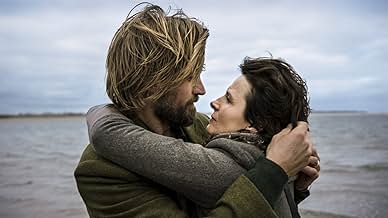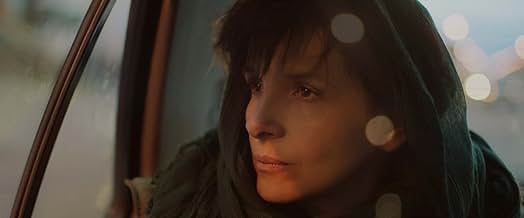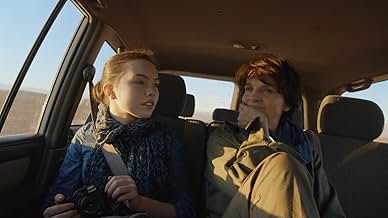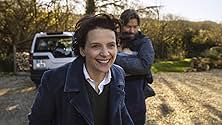IMDb RATING
7.0/10
8.4K
YOUR RATING
Rebecca is one of the world's top war photographers. She must weather a major emotional storm when her husband refuses to put up with her dangerous life any longer.Rebecca is one of the world's top war photographers. She must weather a major emotional storm when her husband refuses to put up with her dangerous life any longer.Rebecca is one of the world's top war photographers. She must weather a major emotional storm when her husband refuses to put up with her dangerous life any longer.
- Awards
- 6 wins & 14 nominations total
Zoubida Akif
- Ariana
- (as Zoubida Afik)
Featured reviews
I came into the movies with an open mind, without any knowledge of either the plot, setting or premise of the movie. The opening left me mesmerized, starting off with a silent photographer documenting a ceremonial initiation of a suicide bomber, to later become hurt in the subsequent IED attack. The following complications and insight to the photographer's life really builds up a powerful and emotional drama that mostly plays out within the borders of her own home.
From the reaction of her husband to their children's acceptance of their mother's dangerous occupation, every scene feels truly genuine. In addition to being a perfectly acted and directed movie, the cinematography is, to say the least, absolutely astonishing and beautiful. From start to end, the movie feels like a beautiful painting, with no expense spared on the details.
The most refreshing feature of this particular movie is the way the story is delivered, in a non-predictable fashion freed from the basic "Hollywood-recipe". To say the least, this is by far one of the best European movie released in years, and I am yet to see a movie this original, captivating, refreshing and complex from Hollywood. 10/10 stars, absolutely a must-see for all movie enthusiasts that appreciate something else than recycled, brain-dead black and white portraits of reality that Hollywood keeps producing.
From the reaction of her husband to their children's acceptance of their mother's dangerous occupation, every scene feels truly genuine. In addition to being a perfectly acted and directed movie, the cinematography is, to say the least, absolutely astonishing and beautiful. From start to end, the movie feels like a beautiful painting, with no expense spared on the details.
The most refreshing feature of this particular movie is the way the story is delivered, in a non-predictable fashion freed from the basic "Hollywood-recipe". To say the least, this is by far one of the best European movie released in years, and I am yet to see a movie this original, captivating, refreshing and complex from Hollywood. 10/10 stars, absolutely a must-see for all movie enthusiasts that appreciate something else than recycled, brain-dead black and white portraits of reality that Hollywood keeps producing.
War photographer Rebecca (Juliette Binoche) is one of the best at her job, obtaining the kind of pictures that invariably get published in western magazines as examples of the violence of conflicts in nonwestern areas such as Afghanistan or Kenya. The only snag is that Rebecca is so obsessed with her work that she cannot understand the damage she is doing to her family back in Ireland, especially her daughter Steph (Lauryn Canny).
The conflict between personal and professional values forms the kernel of Erik Poppe's film. Yet thematically speaking the director is far more interested in prompting reflection on the photographer's trade. While Rebecca certainly shows a good deal of bravery in trying to get the best pictures, we also understand that she is something of a voyeur who actively enjoys intruding into her subjects' personal space. Her fondness for the close-up of suffering people is quite disconcerting, especially in a sequence taking place in the back of an SUV in Afghanistan. In political terms, she adopts a neocolonialist position of the westerner taking scopophilic pleasure in the power she exerts through her camera.
Perhaps the film's most telling moment occurs back in Ireland, when Steph turns the camera on Rebecca and photographs her repeatedly. Rebecca cannot endure the experience of the lens pointing at her in such an intense manner and turns her head away, her eyes filling with tears. Would that Rebecca might understand that her subjects could feel much the same; but if she did so, then she would not be good at her job.
Given the integrity with which Poppe examines this issue, it's rather sad that the film as a whole should be somewhat melodramatic. In the end the action descends into something of a tug-of-love battle between mother and family; at one point Rebecca bundles Steph and her younger sister Lisa (Adrianna Cramer Curtis) in a pathetic attempt to abduct them from their family home. Needless to say husband Marcus (Nikolaj Coaster-Waldau) foils the plot and eventually looks after the girls himself.
The film makes a half-hearted attempt to draw a parallel between Rebecca's wanderlust and the rhythms of the tide (her daughter observes that the photographer is like the sea, coming and going), but unfortunately outstays its welcome: the last half-hour unfolds slowly but predictably towards an inevitable denouement. This is a shame, given the seriousness of its basic premise - almost as if director Poppe had lost the courage of his convictions.
The conflict between personal and professional values forms the kernel of Erik Poppe's film. Yet thematically speaking the director is far more interested in prompting reflection on the photographer's trade. While Rebecca certainly shows a good deal of bravery in trying to get the best pictures, we also understand that she is something of a voyeur who actively enjoys intruding into her subjects' personal space. Her fondness for the close-up of suffering people is quite disconcerting, especially in a sequence taking place in the back of an SUV in Afghanistan. In political terms, she adopts a neocolonialist position of the westerner taking scopophilic pleasure in the power she exerts through her camera.
Perhaps the film's most telling moment occurs back in Ireland, when Steph turns the camera on Rebecca and photographs her repeatedly. Rebecca cannot endure the experience of the lens pointing at her in such an intense manner and turns her head away, her eyes filling with tears. Would that Rebecca might understand that her subjects could feel much the same; but if she did so, then she would not be good at her job.
Given the integrity with which Poppe examines this issue, it's rather sad that the film as a whole should be somewhat melodramatic. In the end the action descends into something of a tug-of-love battle between mother and family; at one point Rebecca bundles Steph and her younger sister Lisa (Adrianna Cramer Curtis) in a pathetic attempt to abduct them from their family home. Needless to say husband Marcus (Nikolaj Coaster-Waldau) foils the plot and eventually looks after the girls himself.
The film makes a half-hearted attempt to draw a parallel between Rebecca's wanderlust and the rhythms of the tide (her daughter observes that the photographer is like the sea, coming and going), but unfortunately outstays its welcome: the last half-hour unfolds slowly but predictably towards an inevitable denouement. This is a shame, given the seriousness of its basic premise - almost as if director Poppe had lost the courage of his convictions.
This is an inspiring movie that shows today's reality of the extremist religious – social politics in countries dominated by radicals, fanatics
Things that we see on the news everyday, and sometimes we just take it for granted
It is happening as I write these words here, and for sure it will still be happening when you will be reading theses lines, and who knows watching the movie
It was nicely and simply shot, totally artistic, and the director was careful enough not to be graphic on scenes that perhaps required some detailed frames. And what to say about Juliete Binoche, I am her fan, so I won't say much about her performance, only that she contributed a lot on her role in order to the story be told the way it was.
I saw this at The Heartland Film Festival in Indianapolis this weekend. It's been 24+ hours since the movie ended, and it's themes are still with me. The horror of war..the difficulty balancing passion and pragmatism...what do children need from their parents... My mind changed such that the final take away is the theme of the film. Life is difficult and decisions have consequences. I want to have coffee with Rebecca and shake her. Tell her how much her children and husband need her..Tell her the sacrifice isn't worth it. Atrocities will continue. Taking pictures of suicide bombers does glamorous the cause. Taking pictures of deceased Africans doesn't bring them to life. Why are you so angry? For these reasons, I must recommend this film. It is not only well acted, but it creates and stirs up emotions, makes you think. Some time more than entertainment is demanded from a film.
What I was hoping would be a thought-provoking trip into the psychology of the heart of bloody conflict instead becomes a pompous, boring, weighted thing of mediocrity. It's almost as if the director believes that the seriousness of the subject matter is enough to make the film compelling to audiences - which it isn't.
Unfortunately an important theme still requires pacing - which is not best accomplished by long silences and slow-mo ad-nauseum. The cardboard supporting cast display all the range of a TV commercial trying to inspire sympathy, and there's some atrocious child acting.
I know many people will feel compelled to like this because of the subject matter and the strong female lead, but beyond the façade of great cinematography and overly emotional music this is simply not well made.
Self-importance sinks this film.
Unfortunately an important theme still requires pacing - which is not best accomplished by long silences and slow-mo ad-nauseum. The cardboard supporting cast display all the range of a TV commercial trying to inspire sympathy, and there's some atrocious child acting.
I know many people will feel compelled to like this because of the subject matter and the strong female lead, but beyond the façade of great cinematography and overly emotional music this is simply not well made.
Self-importance sinks this film.
Did you know
- Trivia"A thousand time goodnight" is a line from William Shakespeare's Romeo and Juliet.
- GoofsWhen Rebecca and Marcus are walking hand in hand on the beach after drinking wine with his colleagues, the second shot is a frontal medium shot. In the upper left part of the shot, the sound operator's boom microphone is briefly, but clearly visible.
- How long is 1,000 Times Good Night?Powered by Alexa
Details
- Release date
- Countries of origin
- Official sites
- Languages
- Also known as
- A Thousand Times Good Night
- Filming locations
- Production companies
- See more company credits at IMDbPro
Box office
- Budget
- €5,284,200 (estimated)
- Gross US & Canada
- $53,895
- Opening weekend US & Canada
- $24,120
- Oct 26, 2014
- Gross worldwide
- $2,549,568
- Runtime
- 1h 57m(117 min)
- Color
- Sound mix
- Aspect ratio
- 2.35 : 1
Contribute to this page
Suggest an edit or add missing content































